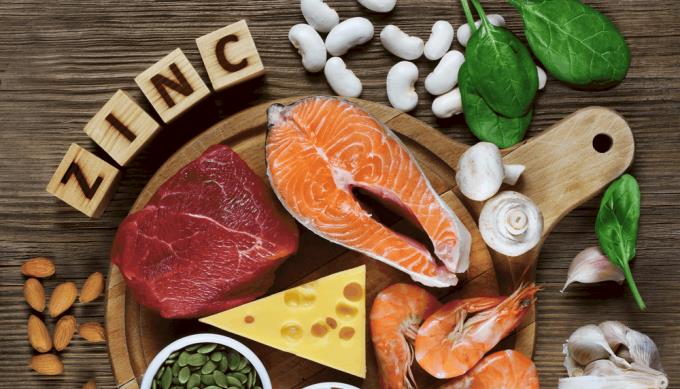The female progesterone index plays an important role in pregnancy and must stay high to ensure your chances of becoming a mother.
Along with estrogen, progesterone belongs to a group of hormones that are indispensable for pregnancy. There are obvious symptoms of a decrease in the hormone progesterone, including mood swings, anxiety, low libido and poor sleep. If you want to quickly catch the good news, make sure that the necessary conditions such as the progesterone index are in the ideal level.
How should progesterone levels be ideal? Please join aFamilyToday Health to learn through the article below.
1. Avoid foods that affect estrogen levels
The female body is born with a balance between the levels of progesterone and estrogen to ensure fertility. If one of the hormones is elevated, the other must drop. Therefore, you should eat soybeans, carrots, olives, green beans ... at a moderate level because they can cause estrogen levels to exceed a stable threshold.
2. Stress reduction is one way of keeping progesterone in an ideal level
Stress is a factor that must be kept under control if you are trying to get pregnant. When the mind is not good for a long time, the body will not produce enough progesterone and women are at risk of infertility. So, look for the popular effective stress reduction methods such as practicing sports, learning yoga to calm down, playing with pets, confiding with your partner, growing bonsai ...
Of course, you can not always laugh, but try to make stress only appear in the shortest possible time.
3. Fat supplementation helps keep progesterone in the ideal level

The body needs fat in the form of cholesterol to produce progesterone. Cholesterol also plays a huge part in the building of the thyroid gland, an important factor in the health of a woman. This means that you have to consume fat consistently and adequately to make your body's progesterone index high enough for fertilization to take place.
Foods like meat, fatty fish and coconut oil are good sources of fat. In addition, fat also plays a huge role in maintaining the body's insulin levels and resolving the possible luteum phase defects .
4. Use vitex compound from the virgin tree
The absorption of vitex by your body will help stimulate your brain to produce more LH (Luteinizing hormone). This is a hormone responsible for the production of progesterone in the body, while also helping to boost the progesterone index. You can take vitex capsules a few times a day in the right dosage under your doctor's consultation to make sure you are ready for pregnancy.
5. Magnesium supplementation helps maintain the balance of the progesterone index
Magnesium is also a mineral that plays a role in assisting women in maintaining hormonal balance in the body. You can choose to get enough magnesium by taking a supplement or by eating foods like black beans, spinach, halibut, whole grains, and other nuts.
6. Zinc supplementation helps to balance progesterone

One of the most important minerals that help you keep your hormone levels at the right level is zinc. The role of zinc has long been held prominently in ensuring fertility. This mineral promotes the pituitary to release hormones that stimulate follicles, thereby stimulating ovulation. You can add zinc to your body by consuming foods such as liver, lean red meat, shellfish and dark chocolate ...
7. Limit your use of herbs
Certain herbs work to increase estrogen levels in a woman's body. This leads to a decrease in the progesterone index and prevents you from conceiving despite trying for a long time. Therefore, you should avoid all of the above herbs, including green cohosh , black cohosh, licorice, lavender, tea tree oil ...
8. Vitamin C supplementation helps maintain the balance of progesterone index
A woman's ovaries absorb ascobic acid prior to ovulation to stimulate ovulation more strongly. Vitamin C facilitates the reabsorption of this ascorbic acid, as it functions as an antioxidant in the body.
Experts have argued that women who take vitamin C properly have higher progesterone scores and pregnancy rates than women who don't. This means you should get enough vitamin C for your body to function better.
Foods like broccoli, lemons, oranges and dark leafy vegetables always have a large amount of vitamin C in them that you can easily choose and prepare.
9. Vitamin E supplementation to improve progesterone index

Vitamin E not only helps to beautify the skin but also can support higher quality women's eggs and increase the chances of pregnancy. Additionally, vitamin E has been shown to improve progesterone levels in at least two-thirds of women. So, take vitamin E from foods like peanuts, sunflower seeds, almonds, papaya and olive oil ... or take capsules to increase your chances of becoming pregnant.
10. Prioritize organic foods
Currently, there are many kinds of foods such as fresh fruits and vegetables for sale that contain bad chemicals due to the use of fertilizers and pesticides by growers and thereby adversely affecting pregnancy. Therefore, you should choose to buy food from reputable, quality-guaranteed supermarkets. This prevents hormones or pesticide residues from entering the body, increasing your chances of having good news.
Hopefully, the suggestions given can help you answer the question what to do to increase progesterone levels. In general, try to maintain a healthy lifestyle, stay positive and avoid eating foods that make your hormones unbalanced for more successful conception.














